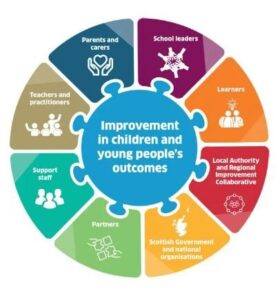An Empowered System

Learners should feel empowered within their classroom or learning environment. They should receive high quality feedback and have an accurate understanding of their progress and what they need to do to improve. Learners should also be able to give effective feedback to peers on their learning and suggest ways in which they can improve. This builds confidence and resilience in learners.
Learner participation can be achieved by supporting learners to build the skills encapsulated in the four capacities of the curriculum, aiming for all learners to become; Successful Learners, Confident Individuals, Responsible Citizens, Effective Contributors. Learner participation should underpin the ethos of the school community, with emphasis placed on building positive relationships between all contributors in an empowered system.
Further guidance on empowering learners can be viewed here:
In 2019, a Thematic Inspection on the Empowerment of Parents & Pupils was published:
How Good Is Our School Framework
Part One: A guide for staff and partners working with children and young people will support self-evaluation of your current approaches to learner participation. It is intended to be used by school staff and partners working collaboratively with children and young people to evaluate what is working well and consider what would support increased learner participation.
includes some suggested activities to support children and young people to evaluate the quality of relationships, learning and teaching, school and community, health and wellbeing and successes and achievements. We are sure that as their skills and confidence increase, children and young people will grow their self evaluation activity in ways which work best for them in their own school context.
Learner Participation in Educational Settings (3-18)
Learner participation is needed for Curriculum for Excellence’s aims and purposes to be achieved across all contexts of learning. Learner participation is a key thread running through the How good is our school? (4th edition, hereafter, HGIOS?4) and How good is our early learning and childcare? (HGIOELC?) documents and is promoted as a key component within Scottish education policy.
The following guidance provides:
• A new definition of learner participation for Scottish education (ages 3-18)
• An evidence-based rationale and set of potential benefits of participation
• Principles and practices for authentic participation
• A four-arena framework for understanding and self-evaluation
Learner Participation Implementation Framework
Used in association with the document above, the implementation framework provides guidance on key activities which can be undertaken at each stage:


